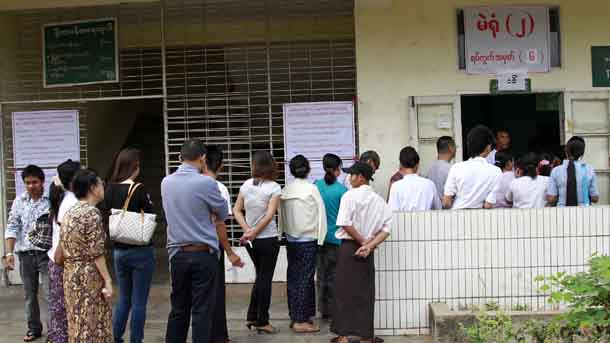KAWHMU—It was around 8 am, two hours after Burma’s polling stations opened. An old lady using a green bamboo stick walks through the gate of a polling station from which pro-democracy icon Aung San Suu Kyi’s car had just left.
The ethnic Karen had just come to cast her vote in Sunday’s crucial by-elections. Daw Aye is the oldest woman in Wah Thin Kha Village, which has three polling stations for Kawhmu Township constituency, south of Rangoon, in which Suu Kyi is standing.
“I am 95 years old,” said Daw Aye whose open mouth showed no teeth at all. When asked who will receive her vote, she replied, “I will vote for someone who is a right person.” When pressed who that was, she lent her frail body forward and stressed, “Aung San Suu Kyi.”
“I was a farmer and things have never been right,” she said while being interviewed by several local and foreign media organizations.“I just want things to be right.”
Daw Aye was one of around 900 voters in this ethnic Karen-dominated village comprised of some 700 houses. Many sport red or blue tradition dress and walked to the polling stations with their similarly-attired children. A large number do not speak fluent Burmese.
Suu Kyi spent last night at her house in the village in order to visit this polling station early to cheer her supporters. The 66-year-old leader of the National League for Democracy (NLD) left her house at around 7 am and visited the polling station before carrying on to other areas of the constituency.
The whole village looked like it was celebrating a festival last night when Suu Kyi’s motorcade arrived. An army of supporters as well as local and foreign journalists seemed to have stormed the small, dusty hamlet.
Some had to sleep in their cars while others took refuge at a local monastery or stayed in villagers’ homes. Some people said it was the biggest festival they could remember in the area.
Like Daw Aye, other elderly people walked into the polling station with smiles. They openly talked to the media about who will receive their votes—Suu Kyi as far as I heard—and what they think of the future.
Meanwhile, in another village’s polling station a few kilometers away, Tin Sein has just cast his vote. “I voted for Aung San Suu Kyi. I don’t support dictatorship,” said the 76-year-old Karen farmer. “She sacrificed a lot. And we people were helpless for more than 60 years.
“You know that on one hand, they [the nominally civilian government] seem to be trying to get peace. On the other hand, they are still fighting,” said Tin Sein who seemed to be more aware of the political situation—particularly fighting between government troops and ethnic armies in border areas—than most voters we encountered.
“I think only idiots will vote for Dr. Soe Min,” he added. Soe Min is the rival candidate for the ruling party Union Solidarity and Development Party (USDP).
Like many political observers, however, Tin Sein doubted how much Suu Kyi can achieve even if she wins the by-election. Only 45 seats are available out of more than 1,000 in the Union Parliament which is dominated by the military-backed USDP. “I am afraid she will just manage to get into the Parliament.” said Tin Sein.
“The country has sacrificed lots of lives generation-by-generation,” he said. Tin Sein himself was put in Insein Jail for four years in 1969 after he was accused of being associated with the Karen National Union—Burma’s longest-running rebel group fighting for autonomy.
Like Daw Aye and Tin Sein, voters are hoping to gain a better life from casting their ballots for Suu Kyi. But many voters approached by my colleagues and I in these villages simply came out to cast a ballot for real change. They feel that the country must continue taking steps for a true transition though President Thein Sein’s reform process initiated since he took office in March 2011.
“Because of President Thein Sein and Shwe Mann [Speaker of Lower House], reforms have taken off. But there seems to be resistance within,” said Tin Sein through his cracked spectacles.
Voters including Daw Aye and Tin Sein will be eagerly anticipating the result. Within a week, they will be officially informed who the winner is. Suu Kyi and her party colleagues are highly likely to win a large number of the 45 seats being contested—but, of course, only if the polling stations are allowed to be free and fair.
However, even if Suu Kyi and her fellow NLD candidates win, there is still a big question for voters like Tin Sein—what change can she really bring about for her supporters with such a small number of representatives in Parliament?

















